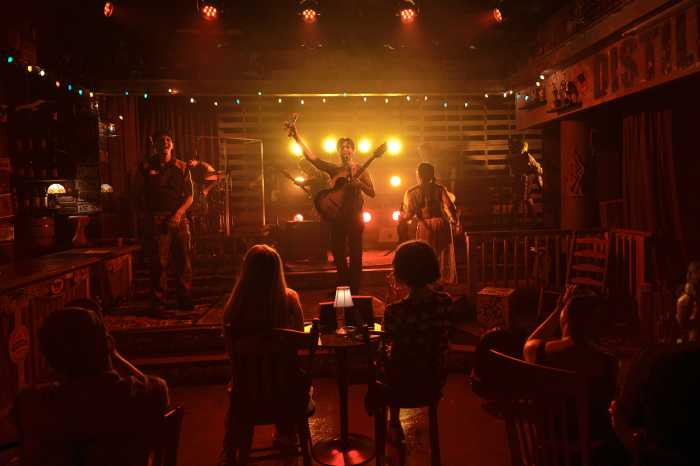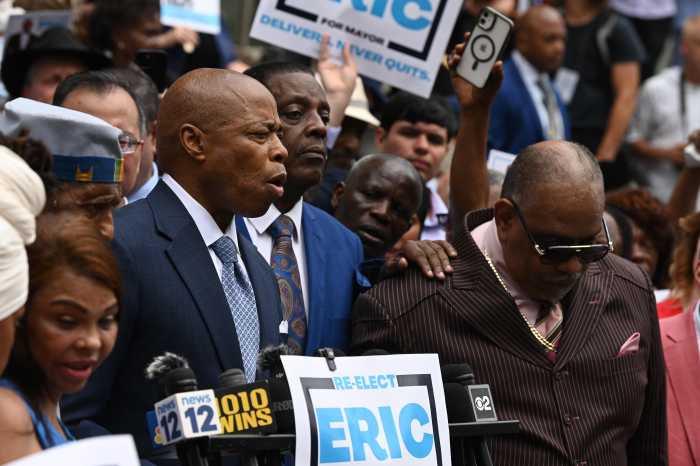When “Cat on a Hot Tin Roof” opened with Terrence Howard taking a shower, his gleaming bare back eliciting howls from a revved-up audience, I knew this umpteenth revival would be like no other.
And how could it be? For this is the first to assemble an all-black dream cast, featuring the legendary James Earl Jones as Big Daddy, Phylicia Rashad as Big Mama, Howard as Brick, and Anika Noni Rose (“Caroline, or Change” and the movie version of “Dreamgirls”) as Maggie.
Debbie Allen, whose expansive credits go well beyond her “Fame” fame, makes her Broadway directing debut.
CAT ON A HOT TIN ROOF
Broadhurst Theatre
235 W. 44th St.
Tue. at 7 p.m.; Wed.- Sat. at 8 p.m.;
Wed. & Sat. at 2 p.m.; Sun at 3 p.m.
$61.50-$96.50; 212-239-6200
Or telecharge.com Through Jun. 22
PASSING STRANGE
Belasco Theater
111 W. 44th St.
Tue. at 7 p.m.; Wed.- Sat. at 8 p.m.;
Wed. & Sat. at 2 p.m.; Sun at 3 p.m.
$26.50-$111.50; 212-239-6200
And while I was intrigued to see how such courageous casting might impact Tennessee Williams' classic 1955 family saga about hypocrisy, greed, mortality, homosexuality, and repression, I never dreamed that it would become — I kid you not – a sort of comedy.
A tragedy for comedy lovers; a musical for Broadway snobs
The stormy drama, to refresh your memory, takes place one evening in the manse of a rich plantation owner in Mississippi. The family has gathered to celebrate Big Daddy's 65th birthday, but all is not happy. He's dying of cancer, but nobody has the guts to tell him. Favorite son Brick is a fervent alcoholic who stopped sleeping with his frantic, childless wife Maggie – the proverbial “cat” – soon after his football buddy and soulmate, Skipper, met an untimely death. The other son, Gooper (Giancarlo Esposito), and his shrew of a wife, Mae (Lisa Arrindell Anderson), scheme to get their grubby hands on Big Daddy's $80 million fortune.
Not that the original didn't hold some potential for comic moments, but Allen has decided to plump them up big-time, softening the sting of Williams' poetically caustic language.
For instance, when a drunken, impotent Brick is so pained, so disgusted, he assaults a nattering Maggie with his crutch, it feels silly and the audience chuckles. In what should have been a poignant moment, when Big Daddy asks, “What's the smell in this room?” and Brick replies “Mendacity,” there are roars of laughter.
For most, the reference point will be the sanitized 1958 film with Paul Newman, Elizabeth Taylor, and Burl Ives, which omitted the coarse language and overt references to homosexuality and added a Hollywood ending where Brick is “cured” and poised to take his rightful place as head of the family (and on top of Maggie).
But this production is based, as it should be, on a 1974 version that Williams wrote, where the dialogue is spiked with “fuck” and “queer.” The ending is ambiguous, though it doesn't look like ol' Brick is succumbing to Maggie's charms anytime soon.
Comedic excursions aside, the performances are superb. Rashad lobs a tender spin on battle-axe Big Mama. Rose's catty Maggie fiercely retains her feral allure. And Howard adroitly captures the nobility of a broken man diving headlong into the abyss of a whiskey bottle.
As the “no-neck monsters,” the kiddies are glaringly miscast, which made we wonder if nepotism was to blame (turns out that one is, indeed, Howard's daughter). And the youngest is simply too darned adorable for even Big Daddy to hate.
Stew, the creator of “Passing Strange,” the semi-autobiographical show that recently opened at the Belasco Theater, is not a fan of conventional Broadway shows, and he's not afraid to admit it.
In fact, the husky, African-American multi-talent, who also fronts a band named “The Negro Problem,” is fearless about speaking up about a range of racially-tinged topics normally seen as off-limits. And that's just one reason this rock concert hybrid, co-written with Heidi Rodewald, is so invigorating.
Although wildly uneven, “Passing Strange” is a rollicking screed against artifice, which has always been a cornerstone of the Great White Way.
Stew's disdain for trumped-up treacle-fests is clear from the get-go. The stage is completely bare, save for the four wailing musicians (prominently credited as cast members in the Playbill) and a backdrop of dazzling neon lights, designed by Kevin Adams.
The real Stew serves as affable commentator on the proceedings, while a gifted, hyperkinetic Daniel Breaker plays younger, callow Stew during his fraught coming-of-age journey in the 1970s and '80s.
The “passing” in the play's title, as you may have guessed, refers to masquerading to please others. Sure, the most obvious case is a black person passing for white. It also refers to an atheist passing for a Christian, and, oddly enough, a black person passing for, well, a “real” black person. Passing has a price, however.
Just as “Passing Strange” dares to be a different kind of musical, Stew dares to be a different kind of black man. Eschewing the brooding, well-muscled stereotype, Stew is more of a brainy dork. At age 14, he's partial to Buddhism and punk rock, while his prim mother (Elsa Davis) is content living an “integrated” middle class existence in Los Angeles (though she affects a “Negro dialect” when she's angry).
Inspired by the unexpected rock 'n roll beats from his church, Stew embarks on a quest to “keep it real,” and first flees to Amsterdam, a hotbed of drug-induced free expression, and later joins the bitter capitalist-hating revolutionaries in Berlin. His mother, a font of unconditional love, begs him to come home, but he rejects her and the mediocrity she represents.
“Why don't you want to be around your own people?” she asks. His response? “America can't handle freaky Negroes.”
To “blacken up a bit,” Stew reinvents himself as an oppressed “ghetto warrior” from the ganglands of South Central LA.
The patchy script is laced with wickedly funny moments, like when a female Berliner, awed by Stew's street cred, squeals the malapropism, “I vant to be reincarcerated as a black man!”
The music, a whimsical amalgam of punk, rock, jazz, and soul, is most distinguished for its staunch refusal to include hip-hop. A daring move, indeed.
While “Passing Strange” is inventively staged by Annie Dorsen, the unlikely dramatic conceit and intermittent flashes of brilliance ultimately add up to very little. So in the end, one question remains – is this earnest, scattershot work “passing” as a real Broadway musical?


































